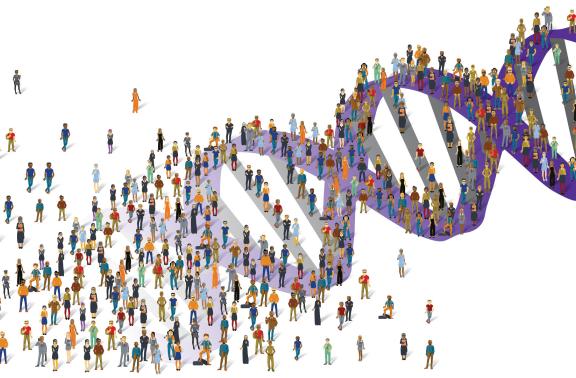
ELSIhub Collections | Ethical, Legal, and Social Implications (ELSI) at the Intersection of Genomics and Infectious Disease
Click here for all ELSIhub Collections
Collection Editors
Debra JH Mathews, PhD, MA, Center for Bridging Infectious Disease, Genomics, and Society (BRIDGES), Assistant Director for Science Programs at the Berman Institute of Bioethics and Associate Professor of Genetic Medicine at Johns Hopkins University
Sheethal Jose, PhD Student in Bioethics and Health Policy, Center for Bridging Infectious Disease, Genomics, and Society (BRIDGES), Johns Hopkins Berman Institute of Bioethics and the Bloomberg School of Public Health
Introduction
Scientific and technological advances in the field of genomics have the potential to enable targeted clinical and public health measures to manage infectious disease outbreaks. The convergence of the fields of genomics and public health in the context of infectious disease raises a unique constellation of ethical, legal, and social issues that must be addressed before genomic data and technology are leveraged at the population level. Similarly, both pathogen genomics and host (or human) genomics play a role in the clinical management of infectious disease and raise their own ELSI issues. The COVID-19 pandemic, coupled with advances in genomic sequencing technology, has provided a global laboratory for identifying, for example, host genomic factors that influence an individual’s risk of severe COVID-19 disease. The identification of such factors has implications for both clinical management and public health practice.
While not an exhaustive list, this collection provides an introduction to the ELSI literature at the intersection of genomics and infectious diseases in both the clinical and public health contexts. The articles listed below focus primarily on the examples of SARS-CoV-2/COVID-19 and HIV/AIDS, but the ELSI issues raised are applicable across the infectious disease spectrum. The first set of articles provides historical context for the concept of disease causation and the blurring boundary between infectious and genetic diseases. The next two groups of articles focus on the different ELSI issues raised by host genomics (using the example of COVID-19) and pathogen genomics (using the example of HIV), respectively, in research, clinical, and public health contexts. The fourth set of articles provides a glimpse into the history of race and racism in both genomics and infectious disease and highlights the critical need for viewing the ELSI issues raised at this intersection through a health disparities lens. Lastly, the fifth group of articles attempts to provide concrete ways of addressing these ELSI issues and identifies areas for further research.
Historical Pandemic Response and the Evolution of the Understanding of Disease Causation
- White, A. I. R. (2018). Global risks, divergent pandemics: Contrasting responses to bubonic plague and smallpox in 1901 Cape Town. Social Science History, 42(1), 135-158.
- Juengst, E. T. (2000). Concepts of disease after the Human Genome Project. In S. Wear, J. J. Bono, G. Logue, & A. McEvoy (Eds.), Ethical issues in health care on the frontiers of the twenty-first century (pp. 127-154). Springer, Dordrecht.
- Worboys, M. (2001). From heredity to infection? Tuberculosis, 1870-1890. In J.-P. Gaudillière & I. Löwy (Eds.) Heredity and infection: The history of disease transmission (1st ed., pp. 81-100). Routledge.
The Intersection of Host Genomics and Infectious Diseases with a Focus on SARS-CoV-2/COVID-19
- Geller, G., Dvoskin, R., Thio, C. L., Duggal, P., Lewis, M. H., Bailey, T. C., Sutherland, A., Salmon, D. A., & Kahn, J. P. (2014). Genomics and infectious disease: A call to identify the ethical, legal and social implications for public health and clinical practice. Genome Medicine, 6(11), 1-13.
- Geller, G., Duggal, P., Thio, C. L., Mathews, D., Kahn, J. P., Maragakis, L. L., & Garibaldi, B. T. (2020). Genomics in the era of COVID-19: Ethical implications for clinical practice and public health. Genome Medicine, 12(1), 1-4.
- Milne, R. (2020). Societal considerations in host genome testing for COVID-19. Genetics in Medicine, 22(9), 1464-1466.
Pathogen Genomics with a Focus on HIV/AIDS
- Coltart, C. E., Hoppe, A., Parker, M., Dawson, L., Amon, J. J., Simwinga, M., Geller, G., Henderson, G., Laeyendecker, O., Tucker, J. D., Eba, P., Novitsky, V., Vandamme, A.-M. , Seeley, J., Dallabetta, G., Harling, G., Grabowski, M. K., Godfrey-Faussett, P., Fraser, C.,… Pillay, D. (2018). Ethical considerations in global HIV phylogenetic research. The Lancet HIV, 5(11), e656-e666.
- Mehta, S. R., Schairer, C., & Little, S. (2019). Ethical issues in HIV phylogenetics and molecular epidemiology. Current Opinion in HIV and AIDS, 14(3), 221.
- Mutenherwa, F., Wassenaar, D., & de Oliveira, T. (2020). Adding a voice to the unique ethical considerations in molecular HIV surveillance. The American Journal of Bioethics, 20(10), 34-36.
- Molldrem, S., & Smith, A. K. (2020). Reassessing the ethics of molecular HIV surveillance in the era of cluster detection and response: Toward HIV data justice. The American Journal of Bioethics, 20(10), 10-23.
- Johnson, S., & Parker, M. (2020). Ethical challenges in pathogen sequencing: a systematic scoping review. Wellcome Open Research, 5.
Racism, Genomics, and Infectious Disease
- Non, A. L., & Gravlee, C. C. (2015). Biology and culture beyond the genome: Race, racism, and health. American Anthropologist, 117(4), 737-738.
- Chowkwanyun, M., & Reed Jr., A. L. (2020). Racial health disparities and Covid-19—caution and context. New England Journal of Medicine, 383(3), 201-203.
- Guta, A., Gagnon, M., & Philbin, M. M. (2020). Ethical convergence and ethical possibilities: The implications of new materialism for understanding the molecular turn in HIV, the response to COVID-19, and the future of bioethics. The American Journal of Bioethics, 20(10), 26-29.
Conceptual and Empirical Responses to the Blurring Boundary
- Ralefala, D., Kasule, M., Wonkam, A., Matshaba, M., & de Vries, J. (2020). Do solidarity and reciprocity obligations compel African researchers to feedback individual genetic results in genomics research? BMC Medical Ethics, 21(1), 1-11.
- Boyce, A. M., & Garibaldi, B. T. (2019). Genomics and high-consequence infectious diseases: A scoping review of emerging science and potential ethical issues.Health Security , 17(1), 62-68.
- Walker, A., Boyce, A., Duggal, P., Thio, C. L., & Geller, G. (2020). Genomics and infectious diseases: Expert perspectives on public health considerations regarding actionability and privacy. Ethics & Human Research, 42(3), 30-40.
- Juengst, E. T., & Van Rie, A. (2020). Transparency, trust, and community welfare: Towards a precision public health ethics framework for the genomics era. Genome Medicine, 12(1), 1-3.


